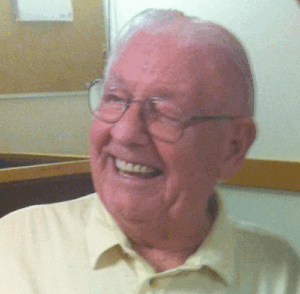
The old Barons joined the original, and often troubled, Western Jr. “B” League in 1961. When the league was rebranded as the Southern Ontario Junior A Hockey League in 1968, the Barons came along and, in 1970, changed their name to the Elgins. The SOJHL operated as a Tier II Junior A league from the late 1960s until 1976 in Southern Ontario, Canada.
In 1969, the Barons captured the Western Ontario Junior “A” Championship. As part of a league agreement with the Western Canada Hockey League, they traveled to Flin Flon, Manitoba, to face Bobby Clarke and the WCHL Champion Flin Flon Bombers in a best-of-seven series for national bragging rights. The Bombers took the first three games, and midway through game four, the Barons left the ice, citing violent play, effectively forfeiting the championship.
The Elgins folded in 1973 but returned the following season as the Colonels in the Central Junior C Hockey League. In 1976, the team moved up to the short-lived Southwestern Ontario Junior “B” Hockey League. When that league folded, the Colonels joined the new Western League, changing their name to the Pests in 1980. The unpopular name didn’t last long — by 1984, they became the Stars, the identity they proudly skate under today.
Season-by-Season Results
|
Season |
GP |
W |
L |
T |
OTL |
GF |
GA |
P |
Results |
Playoffs |
|
|
40 |
20 |
18 |
2 |
– |
213 |
206 |
42 |
4th WOJBHL |
|
||
|
1965-67 |
Western Jr. B Standings Not Available |
||||||||||
|
50 |
25 |
22 |
3 |
– |
297 |
241 |
53 |
3rd WOJBHL |
|
||
|
56 |
37 |
18 |
1 |
– |
255 |
178 |
75 |
1st WOJAHL |
Won League, Lost National Final |
||
|
63 |
31 |
21 |
2 |
– |
245 |
236 |
64 |
3rd WOJAHL |
|
||
|
44 |
13 |
26 |
5 |
– |
205 |
270 |
31 |
5th SOJAHL |
|||
1968-69 Barons Roster
1968-69 St. Thomas Barons [WOJAHL]
|
|
Regular Season |
Playoffs |
|||||||||||||
| 6 | Dennis Desrosiers | 1949-03-28 | 19 | R | |||||||||||
| 2 | Bob Vandenberghe | ||||||||||||||
| 21 | Stan Worosz | G | |||||||||||||
| 4 | Jim Pinnegar | ||||||||||||||
| 19 | Brian Stephenson | ||||||||||||||
| 5 | Ken Murray | 1948-01-22 | 20 | D | |||||||||||
| 8 | Glen Crysler | ||||||||||||||
| 16 | Hal Kewley | ||||||||||||||
| 15 | Rick Howie | 1948-04-24 | 20 | C | |||||||||||
| 1 | Ron Marlow | 1948-02-10 | 20 | G | |||||||||||
| 10 | Doug Macaulay | ||||||||||||||
| 12 | Paul Thomas | ||||||||||||||
| 14 | Ron Lane | ||||||||||||||
| 11 | Jack Criel | 1947-07-12 | 21 | D | |||||||||||
| 21 | Bob Bishop | ||||||||||||||
| 7 | Peter Fraser | ||||||||||||||
| 20 | Mayo Paquette | ||||||||||||||
| 17 | Brian Randall | L | |||||||||||||
| 3 | Fin Melville | ||||||||||||||
| 9 | Al Lennox | ||||||||||||||
| 1 | Art Fraser | G | |||||||||||||
| 14 | Ron Anderson | 1948-11-15 | 19 | D | |||||||||||
| 18 | Craig Cook | ||||||||||||||
Barons in the NHL
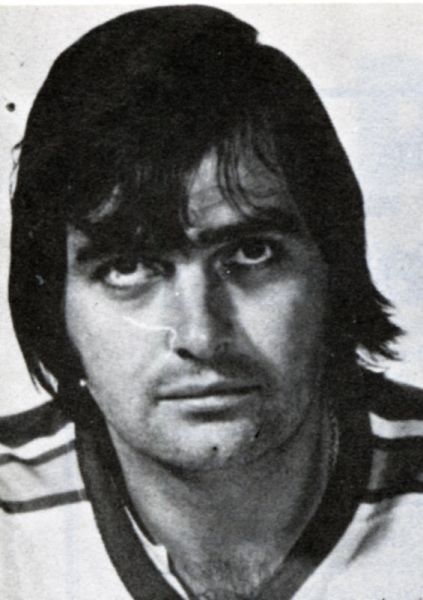 |
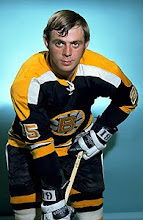.jpg) |
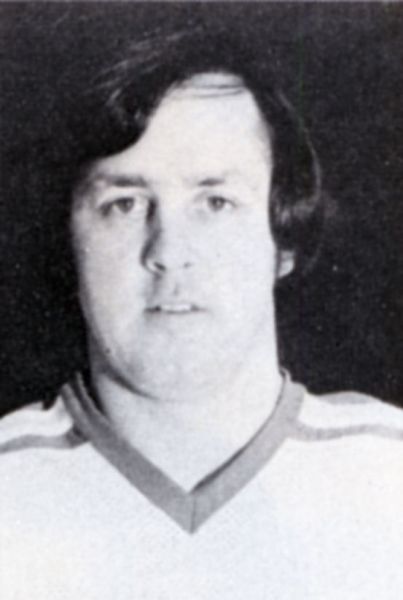 |
| Rick Foley (D) | Danny Schock(F) | Ken Murray (D) |
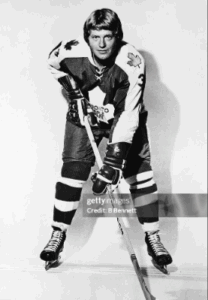 |
| Brent Selwood |

Keith Kewley
Inducted into the Hall of Fame in 2005; the name Kewley is synonymous with Scottish ice hockey in the 1940s and 1950s. Claude Kewley, a Toronto sports journalist, served as the Canadian scout for the Scottish Ice Hockey Association, selecting the rosters for the seven teams in the Scottish National League until 1949. Four of his six sons — Keith, Herb, Hal, and Danny — would go on to play successfully in Scotland.
William Keith Kewley, born July 10, 1925, in Stratford, Ontario, became a driving force behind major trophy wins for three clubs during the 1940s and ’50s — as Captain and later Coach of the Dunfermline Vikings, and as Coach of both the Ayr Raiders and Paisley Pirates. Remarkably, he became a full-time coach at just 22 years old. Known for meticulous preparation, innovative strategies, and creative set plays, Kewley’s methods set him apart from many of his older, more traditional coaching rivals.
A strong believer in developing Scottish talent, Kewley successfully integrated local players into Canadian-dominated rosters — nurturing stars like the Syme brothers and Johnny Rolland at Dunfermline; Lawson Neil, Dave McCrae, and Ken McMurtrie at Ayr; and Billy Brennan, Joe Brown, Billy Crawford, and Dave Ferguson at Paisley. While his interest in developing homegrown players was genuine, it was also practical: a small roster of 10–12 Canadian imports playing a grueling 60-plus game schedule would inevitably need reinforcements. Training local players was cost-effective — and left a lasting legacy in British ice hockey.
Kewley learned the game in Kitchener, Ontario, before his family moved to Toronto when his father became Assistant Sports Editor of The Globe and Mail. Playing as a winger, he helped the Toronto Victory Aircraft — alongside his younger brother Herb — capture the 1944–45 Ontario Hockey Association Junior ‘B’ championship. Sponsored by a wartime aircraft manufacturer that built Lancaster bombers for the Royal Canadian Air Force, Kewley also worked as an office supervisor at the plant.
In 1946, at age 21, he crossed the Atlantic to join the Dunfermline Vikings in the revived Scottish League. Serving as team captain and second-line left wing, he recorded 22 goals and 14 assists for 36 points, along with 37 penalty minutes. Under Head Coach “Scotty” Cameron, Kewley’s influence helped lead the Vikings to the Play-Off Championship, Autumn Cup, and Canada Cup in 1946–47.
Appointed head coach the following season, he guided Dunfermline to the Simpson Trophy in 1947–48. That year, he married May Campbell of Cowdenbeath. The couple spent two years back in Toronto before Ayr Rink Manager Ross Low recruited Kewley to coach the Ayr Raiders in 1950. His two seasons there were highlighted by a Scottish National League and Autumn Cup double in 1951–52.
In 1952, Kewley reunited with his former Dunfermline mentor, Bill Creasey, now manager of the Paisley Pirates. With nearly unlimited practice ice at Paisley’s East Lane stadium, Kewley shaped a dominant team. The 1953–54 season brought a treble — Scottish League, Autumn Cup, and Canada Cup — with a five-man Scottish unit making a major impact, vindicating his faith in local talent.
Kewley coached Paisley through its first two seasons in the ill-fated British National League, earning All-Star “A” Team honours in 1955–56. At 31, with British hockey in decline, he returned to Canada with his wife and two young sons, Harold and Keith, settling in St. Thomas, Ontario. There, he built a career in industry management before moving into real estate brokerage.
All-Time Scottish League/British League Coaching Record:
| TEAM | Games | Wins | Losses | Draws | Winning % |
| Dunfemline Vikings | 56 | 27 | 24 | 5 | 0.527 |
| Ayr Raiders | 120 | 66 | 43 | 11 | 0.596 |
| Paisley Pirates | 234 | 132 | 76 | 26 | 0.620 |
| Total | 410 | 225 | 143 | 42 | 0.600 |
The lure of hockey remained strong for Keith, and from 1956 to 1958 he coached the Senior ‘A’ St. Thomas Royals, bringing in Canadian players such as Ed Lochhead, Cece Cowie, and Art Sullivan — all of whom had played for him in Scotland.
In 1961, with the introduction of Junior ‘B’ hockey to St. Thomas, Keith once again stepped behind the bench. Over the next seven seasons with the St. Thomas Barons, he demonstrated his remarkable ability to develop young talent, guiding the team to the All-Ontario finals in their inaugural season and to a runners-up finish in the Canadian national championship in 1967–68.
After 1968, Keith gradually stepped away from high-level coaching, devoting several seasons to working with St. Thomas Midget teams.
His wife, May, passed away in 1969. Today, Keith enjoys retirement in St. Thomas, surrounded by his two sons, four grandchildren, and four great-grandchildren. He stays active, playing golf regularly with old Scottish hockey friends like Art Sullivan, and spends winters in Florida.
A private man, Keith has always preferred to stay out of the spotlight, letting his players take the credit. Yet the respect he earned as a coach is clear from the words of two of his former Scottish players — both now Hall of Famers themselves. Billy Brennan recalls his first practice with Kewley at age 17:
“It really opened my eyes — I learned more in that hour than I had in the previous four years.”
‘Tuck’ Syme is equally generous in his praise for both Keith and his late brother Herb, an All-Star defenceman at Dunfermline and Ayr:
“The best coaches I had ever seen, way ahead of their time. Without those Kewley brothers, I’d just have been another good skater. They made me a hockey player.”
Originally compiled with provided research by David Gordon – 2005.
Article polished by Vanessa Pimentel, Social Media Team 2025.

Clarke’s orders: ‘We have to take him out’
By MORRIS DALLA COSTA The London Free Press
It’s the kind of incident that is woven into the history of a small town.
In its recall, the details often get expanded or become hazy. But it doesn’t prevent the telling of the tale.
In this case, it’s former Philadelphia Flyer Reggie Leach. Actually, it’s former Flin Flon Bomber Reggie Leach. But it could have been anyone else. It could have been former Bomber and NHLer Bobby Clarke.
Leach returned to St. Thomas as a head table guest for the 33rd St. Thomas Sports Spectacular on Thursday.
It was his first time back in St. Thomas since the infamous 1969 junior A hockey championship between his Bombers and St. Thomas Barons.
It was more than a hockey series. It was more like a head-on collision.
The Bombers won the series
.. . sort of. The best-of-seven never finished. The Barons abandoned the series in the fourth game, skating off the ice in Flin Flon. They blamed the Bombers’ rough play for their decision to withdraw.
“It’s more than 40 years and they still talk about it in St. Thomas, honest to God,” said Harold Kewley, a member of that Barons team. His dad Keith was the coach. “I get a kick out of it. I didn’t back then.”
When the list of guests was announced, Kewley was asked if he wanted to go get his picture taken with Leach.
“Only if he’s in handcuffs,” Kewley said, laughing.
It didn’t take long for the subject to come up once Leach arrived at the afternoon reception.
After being introduced to everyone, he was asked when was the last time he’d been to St. Thomas.
“When we kicked the s— out of you,” he said with a laugh.
Leach went on to a terrific NHL career with the Philadelphia Flyers. Known as the Riverton Rifle, he shares the record for most goals in one postseason with 19.
But Leach had a lot of demons to battle. He began drinking at age 12 and admits that his NHL career was shortened because of his alcoholism.
Now 60, he says he’s been sober for “a lot of years,” and calls helping young people “his passion.”
Leach lives on a reserve called Sucker Creek on Manitoulin Island.
“According to all you white guys, I must have been the only person who ever drank in the National Hockey League,” he said.
He now spends time travelling around the country, usually speaking to First Nation peoples about a program called Life Choices.
That is now, but back in 1969, Leach was a member of a rough and wild Bomber team.
“We weren’t the toughest team in the world and they were,” Barons goaltender Ron Marlow said. “If they didn’t beat you on the scoreboard, they beat you on the ice.”
With players such as Leach and Clarke, though, the Bombers were more than just tough. They had a lot of skill.
“They were better than us, no doubt,” Kewley said.
Leach doesn’t remember much about the series. He was only 17, but he called the Bombers the “toughest junior team I ever played on.”
The Bombers were leading the series 2-1 before the Barons skated off midway through Game 4 in Flin Flon. Kewley remembers the breaking point.
“Doug Macauley went down along the boards and one of their guys tried to kick him in the head,” Kewley said. “At that point, my dad just called us off the ice.”
Marlow remembers that incident vividly: “The player missed and his skate stuck in the boards.”

How did it all start?
In 1969, both the Barons and Bombers were playing in outlaw leagues. The Western Ontario Junior A Hockey League and Western Canada Hockey League were part of the Canadian Hockey Association, not the officially recognized Canadian Amateur Hockey Association. The next few years would see the structure of junior hockey change to what it is now. But at that time, it was in a state of flux.
This series was big news in both Flin Flon and St. Thomas, but it became evident fairly early that this wasn’t going to be your normal series.
“Not only were they tough, but they were dirty,” Marlow said.
Agreed Leach: “We were dirty, but it was the way I learned to play.”
That’s not to say that it was particularly comfortable for the Bombers to play in St. Thomas either, Leach said.
A report in The London Free Press after the first game of the series in St. Thomas seems to support that theory.
“The game was delayed by a barrage of eggs, cherry bombs, whiskey bottles and other debris,” the account read.
It took almost four hours to play the game.
Barons’ Jack Criel was taken off the ice on a stretcher. A fan was taken to hospital after getting hit by a stick and getting in a fight with a number of Bomber players and the coach.
CHA president Ron Butlin called the game “a disgrace.”
After the first two games in St. Thomas, there was some question as to whether the Barons were going to bother making the trip to Flin Flon because of the nature of hockey.
It was a trip they probably wished they hadn’t made.
“They beat us 5-0 in the first game there and I had something like 78 shots,” Marlow said. “It was pretty much one way. But it wasn’t a three-ring circus, it was more like one big ring.”
Marlow swears he’s not exag-gerating.
“The fans, most of them were miners and they weren’t there to see good hockey,” he said. “They wanted to see a few fights. They threw stuff at Flin Flon to get them going to fight, never mind just us.
“There were whiskey bottles and a knife or two on the ice and I’m not exaggerating.”
Leach didn’t disagree.
“It was a tough, tough mining town,” he said. “There were more fights in the stands than on the ice and after the game with us.”
Then things really got wild when the Barons abandoned Game 4.
“We were in the dressing room for two hours,” Kewley said. “Then we all walked out together carrying our hockey bags and sticks and there were 200, 300 people outside the rink throwing bottles and stones. We went back in. They brought the Mounties in and they took us to the hotel. They stood on guard at the hotel all night.”
At this point, Butlin, the CHA president, was upset at the Barons for abandoning the series. He cancelled all the Barons’ flight reservations, hotel rooms and expense money, refusing to pay for anything. The Barons were forced to pool their money and ask for help, which they received, from the city of St. Thomas to get home.
“I remember getting home to St. Thomas and (the Ford dealer) got a bunch of convertibles and we had a parade down Talbot St.,” Kewley said.
The fallout from the series was considerable. The Bombers offered to come east to finish the series in either London or St. Thomas. That offer was rejected.
“I was disappointed, but there was no way they were going to come back, especially in our little sardine can rink,” Leach said. “At that time, they didn’t have the glass, they had the screen. You go along the boards and they’d grab you. That was good-time hockey.”
The CHA suspended Keith Kewley and general manager Jack Cassidy for a year.
“My dad didn’t care,” Kewley said. “He knew he’d done the right thing.”
E-mail morris.dallacosta@sunmedia.ca, or follow MoDaCoatlfpress on Twitter.



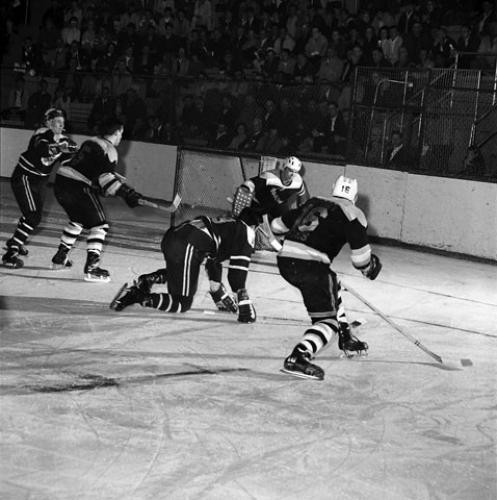

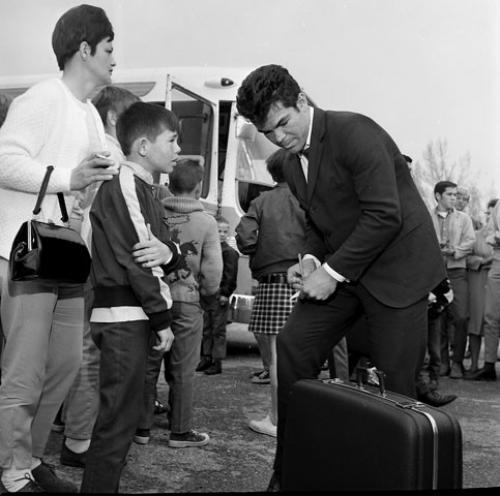
|
RIP COACH KEWLEY
KEWLEY, William Keith Of St. Thomas, passed away peacefully at St. Joseph’s Hospice on July 30th, 2020 at the age of 95. Beloved husband of the late Veronica “Jean” (Cowell) Kewley (2014). Dearly loved father of Harold Kewley (Kathy) and Keith Kewley (May) and step-father of Janet Tucker (Allan), Darrell Munger (Beverley) and Carole Anne Mercer. Cherished grandfather of Lisa (Trevor), Amy, Kelly and Kris and great grandfather of Parker, Brennen, Reece, Ethan, Trent, Leah, Allie, Kade, Klark and Keifer. He was the last of his family, predeceased by his brothers Ken, Mike, Herb, Dan and Harold. Keith was born in Stratford, Ontario on July 10th, 1925, son of the late Claude and Gertrude Kewley. He resided in Scotland and Toronto before settling in the St. Thomas area. He was an avid sportsman and had a very memorable hockey and coaching career. Keith was later inducted to the British Ice Hockey Hall of Fame. Once back in the St. Thomas area, Keith obtained his real estate license and had a very successful real estate career working alongside his sons, Harold and Keith. He was also a long-time member of the Royal Canadian Legion Branch 41. |
St. Thomas Stars Jr. Hockey Club 2025


























